Entrepreneurship & Small Business Management: Project Analysis
VerifiedAdded on 2021/02/20
|15
|4126
|18
Report
AI Summary
This report provides an analysis of entrepreneurship and small business management, focusing on different types of entrepreneurial ventures, their relation to the typology of entrepreneurship, and the similarities and differences between them. It assesses the impact of micro and small businesses on the economy, highlighting their contribution to employment generation and economic growth. The report also examines the key aspects of the entrepreneurial mindset, differentiating it from that of business managers, and cites successful entrepreneurs like Peter Jones and Oprah Winfrey as examples. Furthermore, it discusses the role of small and medium-sized enterprises (SMEs) in contributing to the growth of the social economy by enhancing living standards and fostering innovation. Desklib offers a wealth of resources, including past papers and solved assignments, to support students in their academic endeavors.

Entrepreneurship and Small
Business Management
Business Management
Paraphrase This Document
Need a fresh take? Get an instant paraphrase of this document with our AI Paraphraser
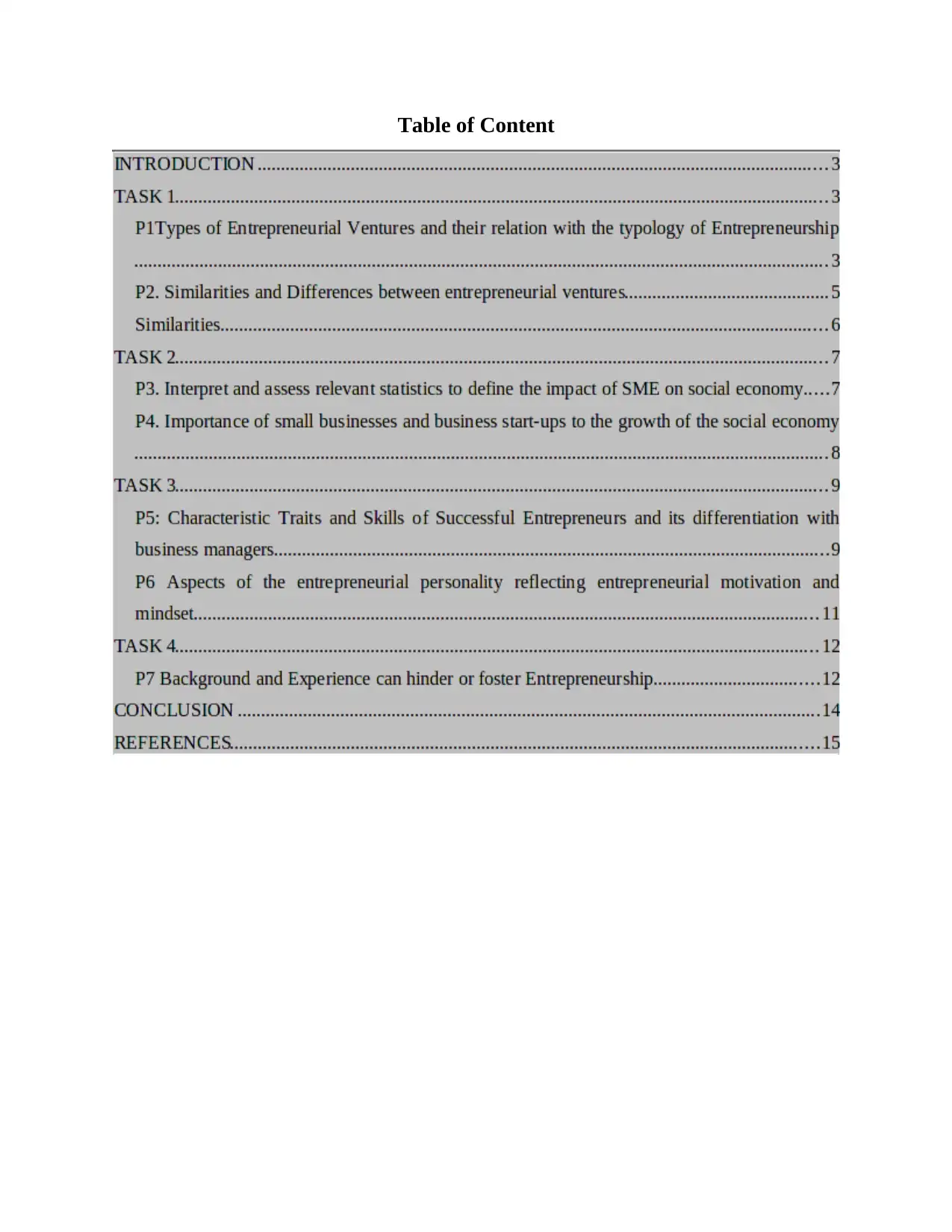
Table of Content
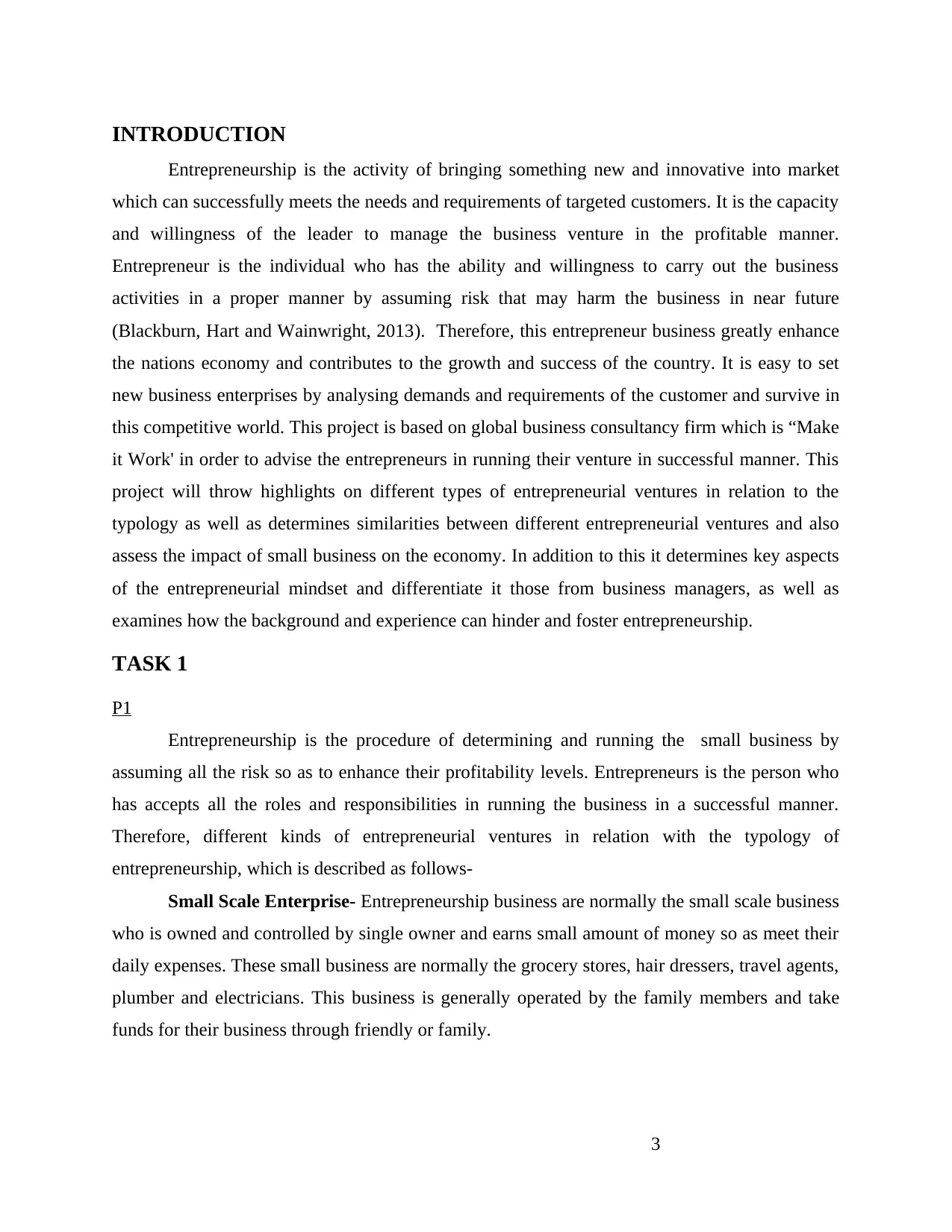
INTRODUCTION
Entrepreneurship is the activity of bringing something new and innovative into market
which can successfully meets the needs and requirements of targeted customers. It is the capacity
and willingness of the leader to manage the business venture in the profitable manner.
Entrepreneur is the individual who has the ability and willingness to carry out the business
activities in a proper manner by assuming risk that may harm the business in near future
(Blackburn, Hart and Wainwright, 2013). Therefore, this entrepreneur business greatly enhance
the nations economy and contributes to the growth and success of the country. It is easy to set
new business enterprises by analysing demands and requirements of the customer and survive in
this competitive world. This project is based on global business consultancy firm which is “Make
it Work' in order to advise the entrepreneurs in running their venture in successful manner. This
project will throw highlights on different types of entrepreneurial ventures in relation to the
typology as well as determines similarities between different entrepreneurial ventures and also
assess the impact of small business on the economy. In addition to this it determines key aspects
of the entrepreneurial mindset and differentiate it those from business managers, as well as
examines how the background and experience can hinder and foster entrepreneurship.
TASK 1
P1
Entrepreneurship is the procedure of determining and running the small business by
assuming all the risk so as to enhance their profitability levels. Entrepreneurs is the person who
has accepts all the roles and responsibilities in running the business in a successful manner.
Therefore, different kinds of entrepreneurial ventures in relation with the typology of
entrepreneurship, which is described as follows-
Small Scale Enterprise- Entrepreneurship business are normally the small scale business
who is owned and controlled by single owner and earns small amount of money so as meet their
daily expenses. These small business are normally the grocery stores, hair dressers, travel agents,
plumber and electricians. This business is generally operated by the family members and take
funds for their business through friendly or family.
3
Entrepreneurship is the activity of bringing something new and innovative into market
which can successfully meets the needs and requirements of targeted customers. It is the capacity
and willingness of the leader to manage the business venture in the profitable manner.
Entrepreneur is the individual who has the ability and willingness to carry out the business
activities in a proper manner by assuming risk that may harm the business in near future
(Blackburn, Hart and Wainwright, 2013). Therefore, this entrepreneur business greatly enhance
the nations economy and contributes to the growth and success of the country. It is easy to set
new business enterprises by analysing demands and requirements of the customer and survive in
this competitive world. This project is based on global business consultancy firm which is “Make
it Work' in order to advise the entrepreneurs in running their venture in successful manner. This
project will throw highlights on different types of entrepreneurial ventures in relation to the
typology as well as determines similarities between different entrepreneurial ventures and also
assess the impact of small business on the economy. In addition to this it determines key aspects
of the entrepreneurial mindset and differentiate it those from business managers, as well as
examines how the background and experience can hinder and foster entrepreneurship.
TASK 1
P1
Entrepreneurship is the procedure of determining and running the small business by
assuming all the risk so as to enhance their profitability levels. Entrepreneurs is the person who
has accepts all the roles and responsibilities in running the business in a successful manner.
Therefore, different kinds of entrepreneurial ventures in relation with the typology of
entrepreneurship, which is described as follows-
Small Scale Enterprise- Entrepreneurship business are normally the small scale business
who is owned and controlled by single owner and earns small amount of money so as meet their
daily expenses. These small business are normally the grocery stores, hair dressers, travel agents,
plumber and electricians. This business is generally operated by the family members and take
funds for their business through friendly or family.
3
⊘ This is a preview!⊘
Do you want full access?
Subscribe today to unlock all pages.

Trusted by 1+ million students worldwide
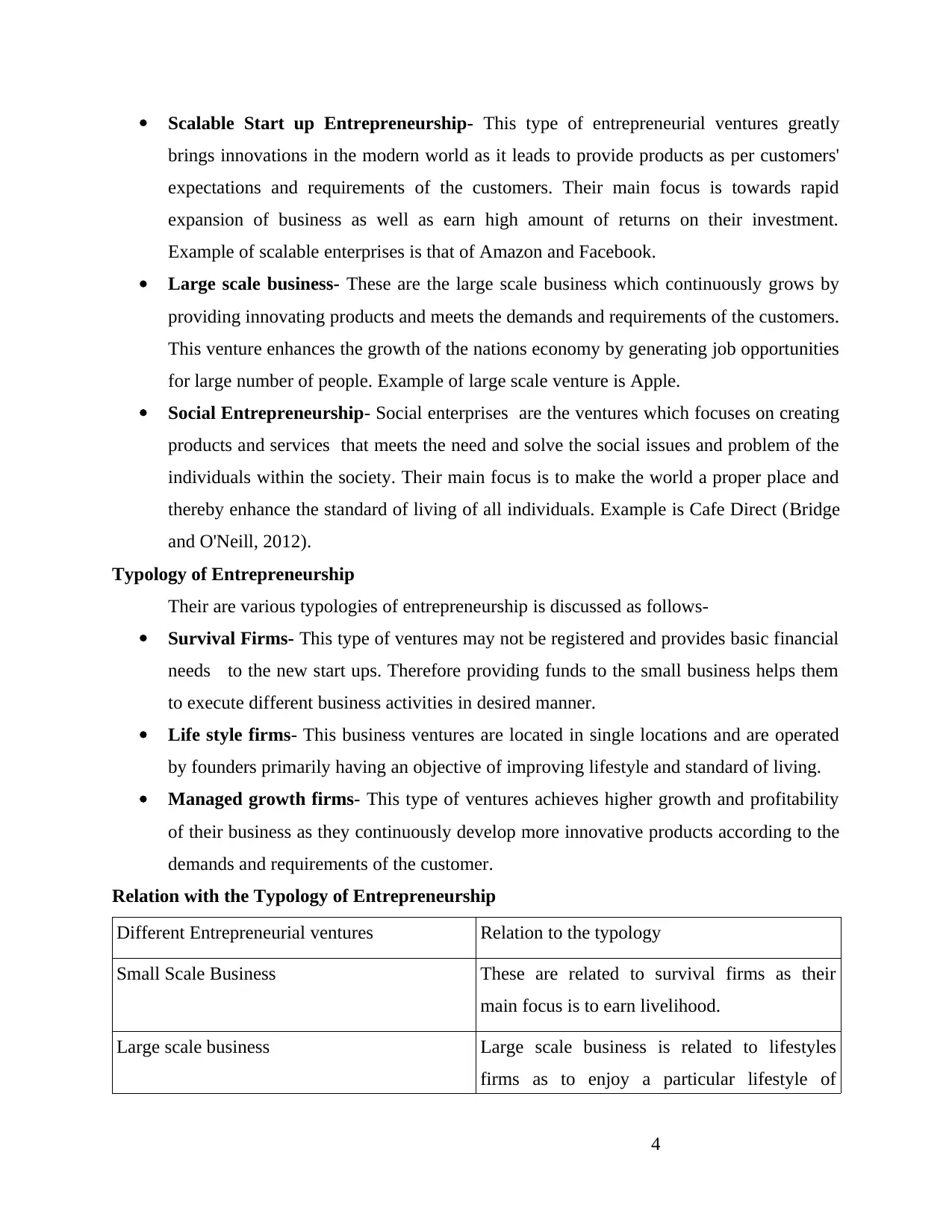
Scalable Start up Entrepreneurship- This type of entrepreneurial ventures greatly
brings innovations in the modern world as it leads to provide products as per customers'
expectations and requirements of the customers. Their main focus is towards rapid
expansion of business as well as earn high amount of returns on their investment.
Example of scalable enterprises is that of Amazon and Facebook.
Large scale business- These are the large scale business which continuously grows by
providing innovating products and meets the demands and requirements of the customers.
This venture enhances the growth of the nations economy by generating job opportunities
for large number of people. Example of large scale venture is Apple.
Social Entrepreneurship- Social enterprises are the ventures which focuses on creating
products and services that meets the need and solve the social issues and problem of the
individuals within the society. Their main focus is to make the world a proper place and
thereby enhance the standard of living of all individuals. Example is Cafe Direct (Bridge
and O'Neill, 2012).
Typology of Entrepreneurship
Their are various typologies of entrepreneurship is discussed as follows-
Survival Firms- This type of ventures may not be registered and provides basic financial
needs to the new start ups. Therefore providing funds to the small business helps them
to execute different business activities in desired manner.
Life style firms- This business ventures are located in single locations and are operated
by founders primarily having an objective of improving lifestyle and standard of living.
Managed growth firms- This type of ventures achieves higher growth and profitability
of their business as they continuously develop more innovative products according to the
demands and requirements of the customer.
Relation with the Typology of Entrepreneurship
Different Entrepreneurial ventures Relation to the typology
Small Scale Business These are related to survival firms as their
main focus is to earn livelihood.
Large scale business Large scale business is related to lifestyles
firms as to enjoy a particular lifestyle of
4
brings innovations in the modern world as it leads to provide products as per customers'
expectations and requirements of the customers. Their main focus is towards rapid
expansion of business as well as earn high amount of returns on their investment.
Example of scalable enterprises is that of Amazon and Facebook.
Large scale business- These are the large scale business which continuously grows by
providing innovating products and meets the demands and requirements of the customers.
This venture enhances the growth of the nations economy by generating job opportunities
for large number of people. Example of large scale venture is Apple.
Social Entrepreneurship- Social enterprises are the ventures which focuses on creating
products and services that meets the need and solve the social issues and problem of the
individuals within the society. Their main focus is to make the world a proper place and
thereby enhance the standard of living of all individuals. Example is Cafe Direct (Bridge
and O'Neill, 2012).
Typology of Entrepreneurship
Their are various typologies of entrepreneurship is discussed as follows-
Survival Firms- This type of ventures may not be registered and provides basic financial
needs to the new start ups. Therefore providing funds to the small business helps them
to execute different business activities in desired manner.
Life style firms- This business ventures are located in single locations and are operated
by founders primarily having an objective of improving lifestyle and standard of living.
Managed growth firms- This type of ventures achieves higher growth and profitability
of their business as they continuously develop more innovative products according to the
demands and requirements of the customer.
Relation with the Typology of Entrepreneurship
Different Entrepreneurial ventures Relation to the typology
Small Scale Business These are related to survival firms as their
main focus is to earn livelihood.
Large scale business Large scale business is related to lifestyles
firms as to enjoy a particular lifestyle of
4
Paraphrase This Document
Need a fresh take? Get an instant paraphrase of this document with our AI Paraphraser
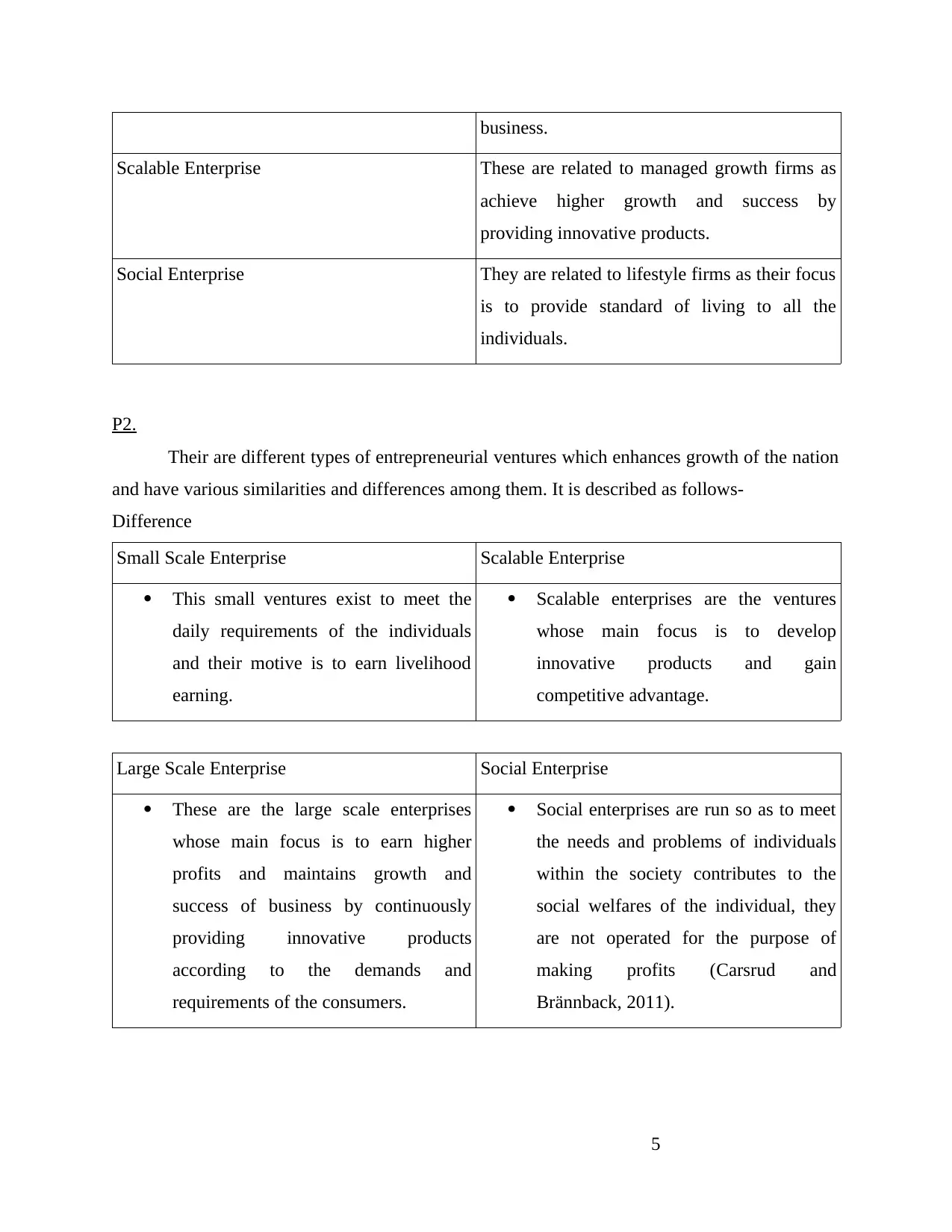
business.
Scalable Enterprise These are related to managed growth firms as
achieve higher growth and success by
providing innovative products.
Social Enterprise They are related to lifestyle firms as their focus
is to provide standard of living to all the
individuals.
P2.
Their are different types of entrepreneurial ventures which enhances growth of the nation
and have various similarities and differences among them. It is described as follows-
Difference
Small Scale Enterprise Scalable Enterprise
This small ventures exist to meet the
daily requirements of the individuals
and their motive is to earn livelihood
earning.
Scalable enterprises are the ventures
whose main focus is to develop
innovative products and gain
competitive advantage.
Large Scale Enterprise Social Enterprise
These are the large scale enterprises
whose main focus is to earn higher
profits and maintains growth and
success of business by continuously
providing innovative products
according to the demands and
requirements of the consumers.
Social enterprises are run so as to meet
the needs and problems of individuals
within the society contributes to the
social welfares of the individual, they
are not operated for the purpose of
making profits (Carsrud and
Brännback, 2011).
5
Scalable Enterprise These are related to managed growth firms as
achieve higher growth and success by
providing innovative products.
Social Enterprise They are related to lifestyle firms as their focus
is to provide standard of living to all the
individuals.
P2.
Their are different types of entrepreneurial ventures which enhances growth of the nation
and have various similarities and differences among them. It is described as follows-
Difference
Small Scale Enterprise Scalable Enterprise
This small ventures exist to meet the
daily requirements of the individuals
and their motive is to earn livelihood
earning.
Scalable enterprises are the ventures
whose main focus is to develop
innovative products and gain
competitive advantage.
Large Scale Enterprise Social Enterprise
These are the large scale enterprises
whose main focus is to earn higher
profits and maintains growth and
success of business by continuously
providing innovative products
according to the demands and
requirements of the consumers.
Social enterprises are run so as to meet
the needs and problems of individuals
within the society contributes to the
social welfares of the individual, they
are not operated for the purpose of
making profits (Carsrud and
Brännback, 2011).
5
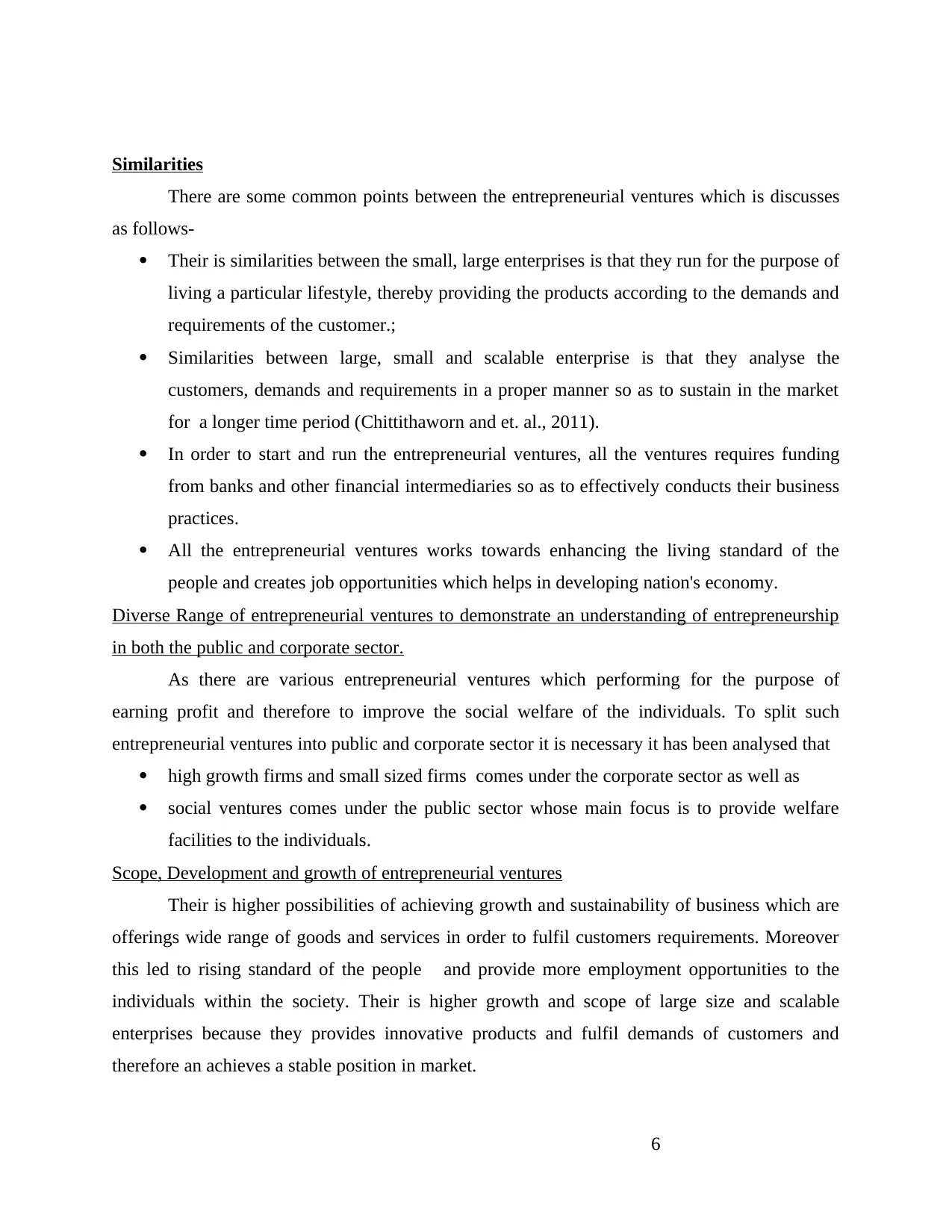
Similarities
There are some common points between the entrepreneurial ventures which is discusses
as follows-
Their is similarities between the small, large enterprises is that they run for the purpose of
living a particular lifestyle, thereby providing the products according to the demands and
requirements of the customer.;
Similarities between large, small and scalable enterprise is that they analyse the
customers, demands and requirements in a proper manner so as to sustain in the market
for a longer time period (Chittithaworn and et. al., 2011).
In order to start and run the entrepreneurial ventures, all the ventures requires funding
from banks and other financial intermediaries so as to effectively conducts their business
practices.
All the entrepreneurial ventures works towards enhancing the living standard of the
people and creates job opportunities which helps in developing nation's economy.
Diverse Range of entrepreneurial ventures to demonstrate an understanding of entrepreneurship
in both the public and corporate sector.
As there are various entrepreneurial ventures which performing for the purpose of
earning profit and therefore to improve the social welfare of the individuals. To split such
entrepreneurial ventures into public and corporate sector it is necessary it has been analysed that
high growth firms and small sized firms comes under the corporate sector as well as
social ventures comes under the public sector whose main focus is to provide welfare
facilities to the individuals.
Scope, Development and growth of entrepreneurial ventures
Their is higher possibilities of achieving growth and sustainability of business which are
offerings wide range of goods and services in order to fulfil customers requirements. Moreover
this led to rising standard of the people and provide more employment opportunities to the
individuals within the society. Their is higher growth and scope of large size and scalable
enterprises because they provides innovative products and fulfil demands of customers and
therefore an achieves a stable position in market.
6
There are some common points between the entrepreneurial ventures which is discusses
as follows-
Their is similarities between the small, large enterprises is that they run for the purpose of
living a particular lifestyle, thereby providing the products according to the demands and
requirements of the customer.;
Similarities between large, small and scalable enterprise is that they analyse the
customers, demands and requirements in a proper manner so as to sustain in the market
for a longer time period (Chittithaworn and et. al., 2011).
In order to start and run the entrepreneurial ventures, all the ventures requires funding
from banks and other financial intermediaries so as to effectively conducts their business
practices.
All the entrepreneurial ventures works towards enhancing the living standard of the
people and creates job opportunities which helps in developing nation's economy.
Diverse Range of entrepreneurial ventures to demonstrate an understanding of entrepreneurship
in both the public and corporate sector.
As there are various entrepreneurial ventures which performing for the purpose of
earning profit and therefore to improve the social welfare of the individuals. To split such
entrepreneurial ventures into public and corporate sector it is necessary it has been analysed that
high growth firms and small sized firms comes under the corporate sector as well as
social ventures comes under the public sector whose main focus is to provide welfare
facilities to the individuals.
Scope, Development and growth of entrepreneurial ventures
Their is higher possibilities of achieving growth and sustainability of business which are
offerings wide range of goods and services in order to fulfil customers requirements. Moreover
this led to rising standard of the people and provide more employment opportunities to the
individuals within the society. Their is higher growth and scope of large size and scalable
enterprises because they provides innovative products and fulfil demands of customers and
therefore an achieves a stable position in market.
6
⊘ This is a preview!⊘
Do you want full access?
Subscribe today to unlock all pages.

Trusted by 1+ million students worldwide
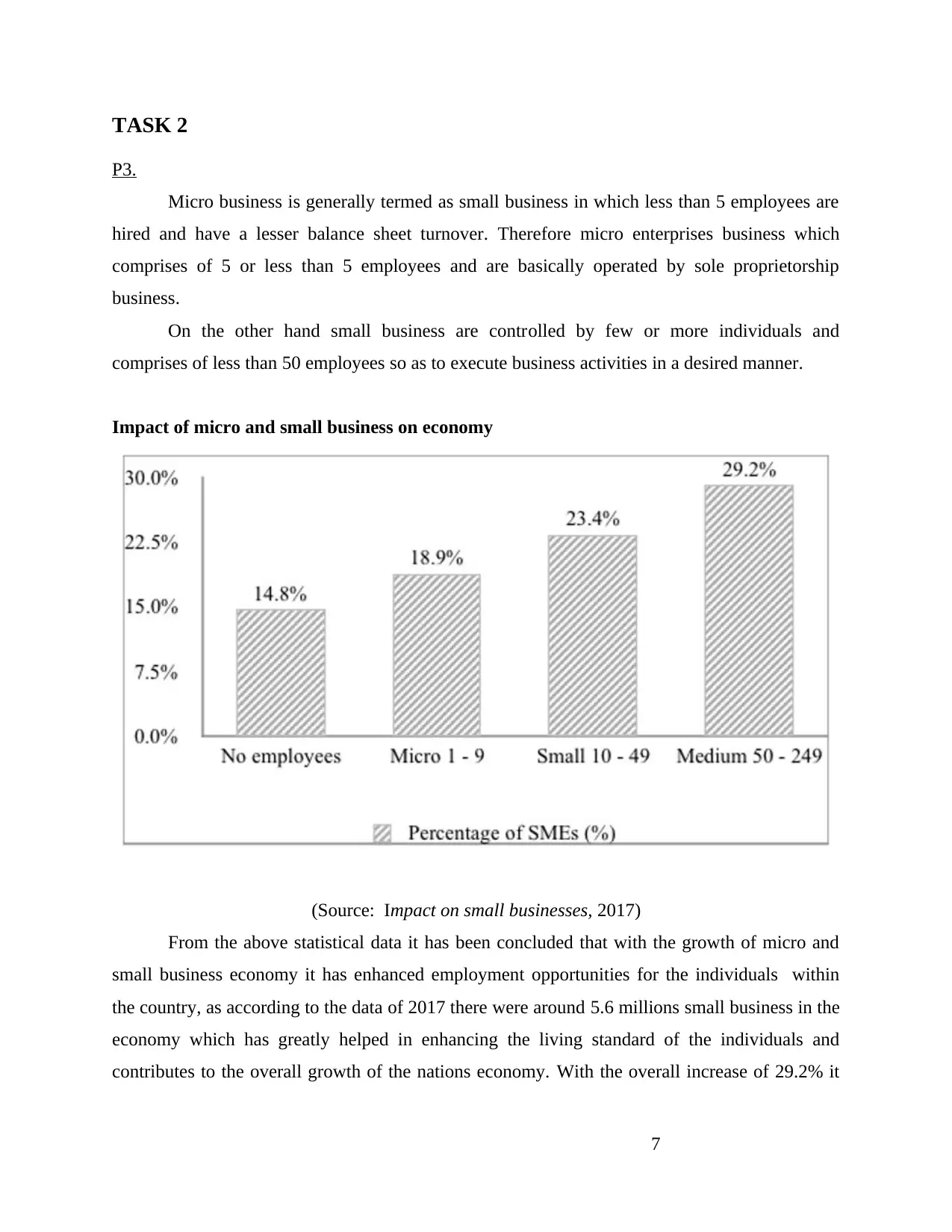
TASK 2
P3.
Micro business is generally termed as small business in which less than 5 employees are
hired and have a lesser balance sheet turnover. Therefore micro enterprises business which
comprises of 5 or less than 5 employees and are basically operated by sole proprietorship
business.
On the other hand small business are controlled by few or more individuals and
comprises of less than 50 employees so as to execute business activities in a desired manner.
Impact of micro and small business on economy
(Source: Impact on small businesses, 2017)
From the above statistical data it has been concluded that with the growth of micro and
small business economy it has enhanced employment opportunities for the individuals within
the country, as according to the data of 2017 there were around 5.6 millions small business in the
economy which has greatly helped in enhancing the living standard of the individuals and
contributes to the overall growth of the nations economy. With the overall increase of 29.2% it
7
P3.
Micro business is generally termed as small business in which less than 5 employees are
hired and have a lesser balance sheet turnover. Therefore micro enterprises business which
comprises of 5 or less than 5 employees and are basically operated by sole proprietorship
business.
On the other hand small business are controlled by few or more individuals and
comprises of less than 50 employees so as to execute business activities in a desired manner.
Impact of micro and small business on economy
(Source: Impact on small businesses, 2017)
From the above statistical data it has been concluded that with the growth of micro and
small business economy it has enhanced employment opportunities for the individuals within
the country, as according to the data of 2017 there were around 5.6 millions small business in the
economy which has greatly helped in enhancing the living standard of the individuals and
contributes to the overall growth of the nations economy. With the overall increase of 29.2% it
7
Paraphrase This Document
Need a fresh take? Get an instant paraphrase of this document with our AI Paraphraser
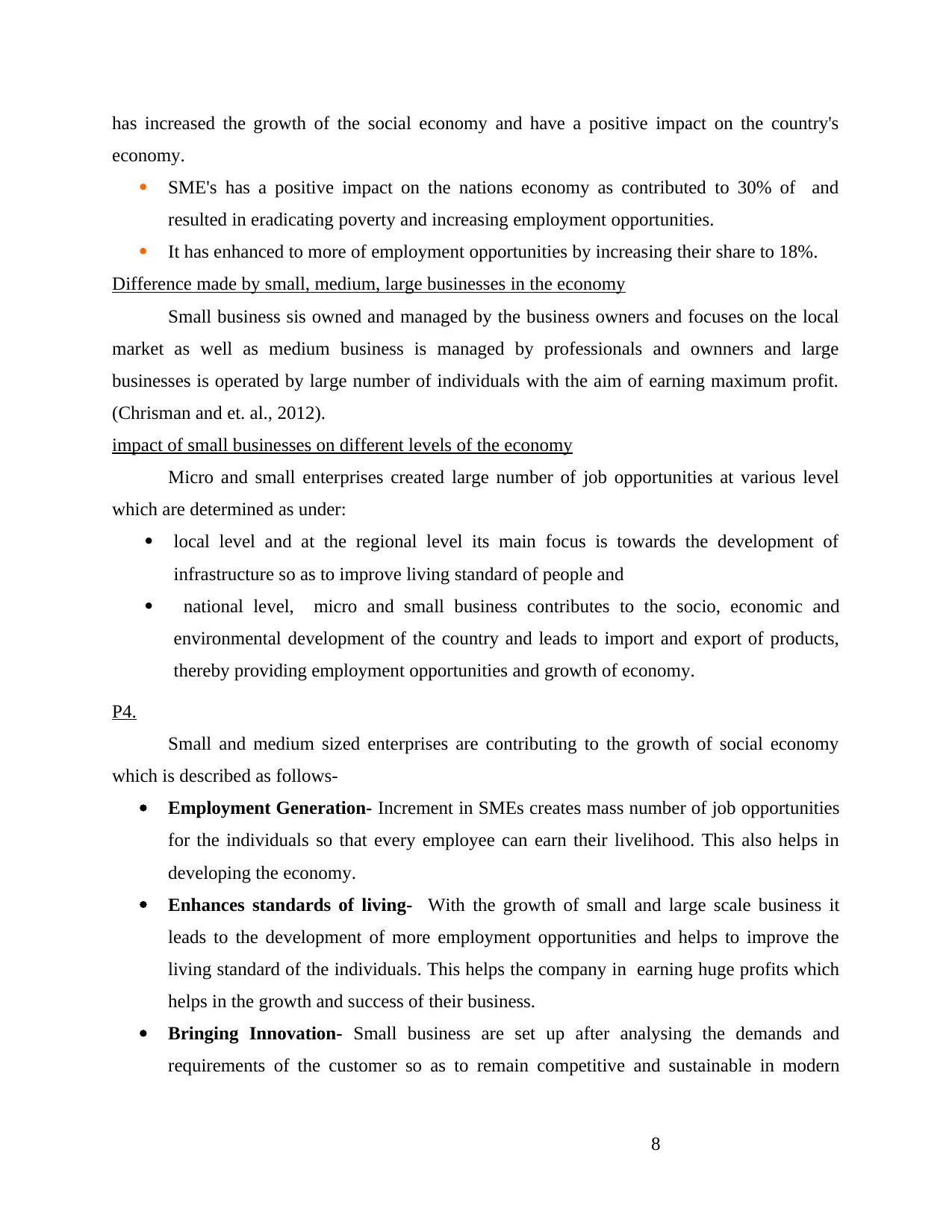
has increased the growth of the social economy and have a positive impact on the country's
economy.
SME's has a positive impact on the nations economy as contributed to 30% of and
resulted in eradicating poverty and increasing employment opportunities.
It has enhanced to more of employment opportunities by increasing their share to 18%.
Difference made by small, medium, large businesses in the economy
Small business sis owned and managed by the business owners and focuses on the local
market as well as medium business is managed by professionals and ownners and large
businesses is operated by large number of individuals with the aim of earning maximum profit.
(Chrisman and et. al., 2012).
impact of small businesses on different levels of the economy
Micro and small enterprises created large number of job opportunities at various level
which are determined as under:
local level and at the regional level its main focus is towards the development of
infrastructure so as to improve living standard of people and
national level, micro and small business contributes to the socio, economic and
environmental development of the country and leads to import and export of products,
thereby providing employment opportunities and growth of economy.
P4.
Small and medium sized enterprises are contributing to the growth of social economy
which is described as follows-
Employment Generation- Increment in SMEs creates mass number of job opportunities
for the individuals so that every employee can earn their livelihood. This also helps in
developing the economy.
Enhances standards of living- With the growth of small and large scale business it
leads to the development of more employment opportunities and helps to improve the
living standard of the individuals. This helps the company in earning huge profits which
helps in the growth and success of their business.
Bringing Innovation- Small business are set up after analysing the demands and
requirements of the customer so as to remain competitive and sustainable in modern
8
economy.
SME's has a positive impact on the nations economy as contributed to 30% of and
resulted in eradicating poverty and increasing employment opportunities.
It has enhanced to more of employment opportunities by increasing their share to 18%.
Difference made by small, medium, large businesses in the economy
Small business sis owned and managed by the business owners and focuses on the local
market as well as medium business is managed by professionals and ownners and large
businesses is operated by large number of individuals with the aim of earning maximum profit.
(Chrisman and et. al., 2012).
impact of small businesses on different levels of the economy
Micro and small enterprises created large number of job opportunities at various level
which are determined as under:
local level and at the regional level its main focus is towards the development of
infrastructure so as to improve living standard of people and
national level, micro and small business contributes to the socio, economic and
environmental development of the country and leads to import and export of products,
thereby providing employment opportunities and growth of economy.
P4.
Small and medium sized enterprises are contributing to the growth of social economy
which is described as follows-
Employment Generation- Increment in SMEs creates mass number of job opportunities
for the individuals so that every employee can earn their livelihood. This also helps in
developing the economy.
Enhances standards of living- With the growth of small and large scale business it
leads to the development of more employment opportunities and helps to improve the
living standard of the individuals. This helps the company in earning huge profits which
helps in the growth and success of their business.
Bringing Innovation- Small business are set up after analysing the demands and
requirements of the customer so as to remain competitive and sustainable in modern
8
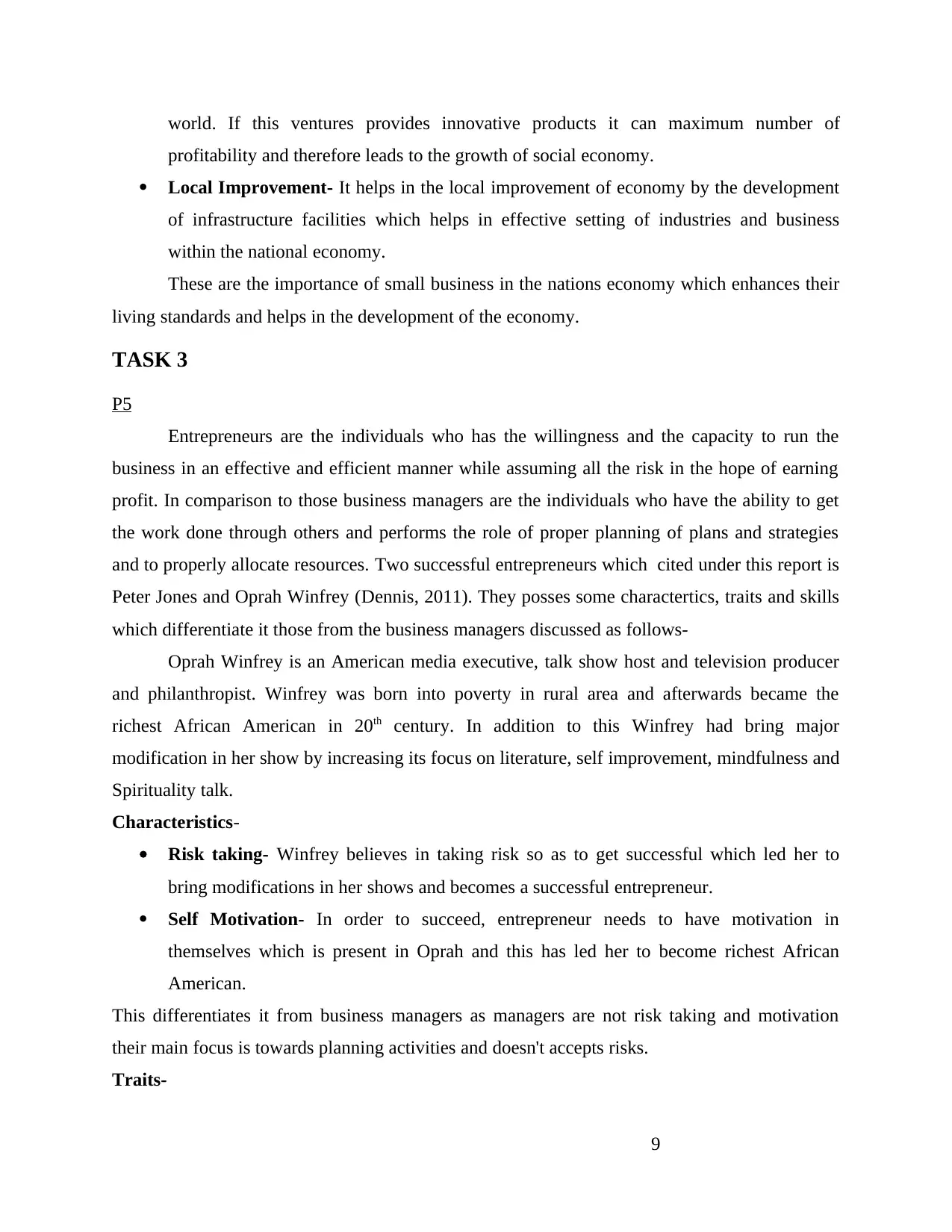
world. If this ventures provides innovative products it can maximum number of
profitability and therefore leads to the growth of social economy.
Local Improvement- It helps in the local improvement of economy by the development
of infrastructure facilities which helps in effective setting of industries and business
within the national economy.
These are the importance of small business in the nations economy which enhances their
living standards and helps in the development of the economy.
TASK 3
P5
Entrepreneurs are the individuals who has the willingness and the capacity to run the
business in an effective and efficient manner while assuming all the risk in the hope of earning
profit. In comparison to those business managers are the individuals who have the ability to get
the work done through others and performs the role of proper planning of plans and strategies
and to properly allocate resources. Two successful entrepreneurs which cited under this report is
Peter Jones and Oprah Winfrey (Dennis, 2011). They posses some charactertics, traits and skills
which differentiate it those from the business managers discussed as follows-
Oprah Winfrey is an American media executive, talk show host and television producer
and philanthropist. Winfrey was born into poverty in rural area and afterwards became the
richest African American in 20th century. In addition to this Winfrey had bring major
modification in her show by increasing its focus on literature, self improvement, mindfulness and
Spirituality talk.
Characteristics-
Risk taking- Winfrey believes in taking risk so as to get successful which led her to
bring modifications in her shows and becomes a successful entrepreneur.
Self Motivation- In order to succeed, entrepreneur needs to have motivation in
themselves which is present in Oprah and this has led her to become richest African
American.
This differentiates it from business managers as managers are not risk taking and motivation
their main focus is towards planning activities and doesn't accepts risks.
Traits-
9
profitability and therefore leads to the growth of social economy.
Local Improvement- It helps in the local improvement of economy by the development
of infrastructure facilities which helps in effective setting of industries and business
within the national economy.
These are the importance of small business in the nations economy which enhances their
living standards and helps in the development of the economy.
TASK 3
P5
Entrepreneurs are the individuals who has the willingness and the capacity to run the
business in an effective and efficient manner while assuming all the risk in the hope of earning
profit. In comparison to those business managers are the individuals who have the ability to get
the work done through others and performs the role of proper planning of plans and strategies
and to properly allocate resources. Two successful entrepreneurs which cited under this report is
Peter Jones and Oprah Winfrey (Dennis, 2011). They posses some charactertics, traits and skills
which differentiate it those from the business managers discussed as follows-
Oprah Winfrey is an American media executive, talk show host and television producer
and philanthropist. Winfrey was born into poverty in rural area and afterwards became the
richest African American in 20th century. In addition to this Winfrey had bring major
modification in her show by increasing its focus on literature, self improvement, mindfulness and
Spirituality talk.
Characteristics-
Risk taking- Winfrey believes in taking risk so as to get successful which led her to
bring modifications in her shows and becomes a successful entrepreneur.
Self Motivation- In order to succeed, entrepreneur needs to have motivation in
themselves which is present in Oprah and this has led her to become richest African
American.
This differentiates it from business managers as managers are not risk taking and motivation
their main focus is towards planning activities and doesn't accepts risks.
Traits-
9
⊘ This is a preview!⊘
Do you want full access?
Subscribe today to unlock all pages.

Trusted by 1+ million students worldwide
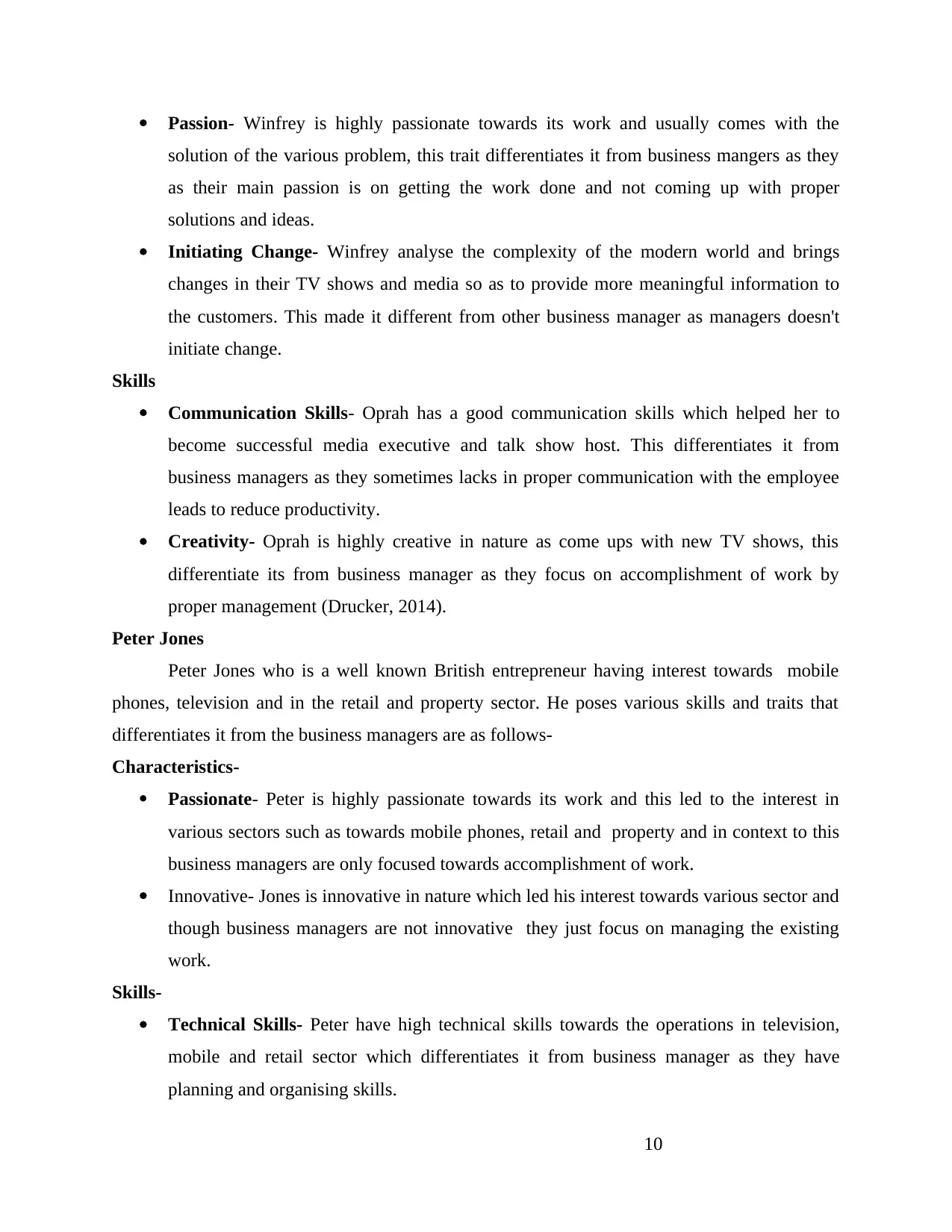
Passion- Winfrey is highly passionate towards its work and usually comes with the
solution of the various problem, this trait differentiates it from business mangers as they
as their main passion is on getting the work done and not coming up with proper
solutions and ideas.
Initiating Change- Winfrey analyse the complexity of the modern world and brings
changes in their TV shows and media so as to provide more meaningful information to
the customers. This made it different from other business manager as managers doesn't
initiate change.
Skills
Communication Skills- Oprah has a good communication skills which helped her to
become successful media executive and talk show host. This differentiates it from
business managers as they sometimes lacks in proper communication with the employee
leads to reduce productivity.
Creativity- Oprah is highly creative in nature as come ups with new TV shows, this
differentiate its from business manager as they focus on accomplishment of work by
proper management (Drucker, 2014).
Peter Jones
Peter Jones who is a well known British entrepreneur having interest towards mobile
phones, television and in the retail and property sector. He poses various skills and traits that
differentiates it from the business managers are as follows-
Characteristics-
Passionate- Peter is highly passionate towards its work and this led to the interest in
various sectors such as towards mobile phones, retail and property and in context to this
business managers are only focused towards accomplishment of work.
Innovative- Jones is innovative in nature which led his interest towards various sector and
though business managers are not innovative they just focus on managing the existing
work.
Skills-
Technical Skills- Peter have high technical skills towards the operations in television,
mobile and retail sector which differentiates it from business manager as they have
planning and organising skills.
10
solution of the various problem, this trait differentiates it from business mangers as they
as their main passion is on getting the work done and not coming up with proper
solutions and ideas.
Initiating Change- Winfrey analyse the complexity of the modern world and brings
changes in their TV shows and media so as to provide more meaningful information to
the customers. This made it different from other business manager as managers doesn't
initiate change.
Skills
Communication Skills- Oprah has a good communication skills which helped her to
become successful media executive and talk show host. This differentiates it from
business managers as they sometimes lacks in proper communication with the employee
leads to reduce productivity.
Creativity- Oprah is highly creative in nature as come ups with new TV shows, this
differentiate its from business manager as they focus on accomplishment of work by
proper management (Drucker, 2014).
Peter Jones
Peter Jones who is a well known British entrepreneur having interest towards mobile
phones, television and in the retail and property sector. He poses various skills and traits that
differentiates it from the business managers are as follows-
Characteristics-
Passionate- Peter is highly passionate towards its work and this led to the interest in
various sectors such as towards mobile phones, retail and property and in context to this
business managers are only focused towards accomplishment of work.
Innovative- Jones is innovative in nature which led his interest towards various sector and
though business managers are not innovative they just focus on managing the existing
work.
Skills-
Technical Skills- Peter have high technical skills towards the operations in television,
mobile and retail sector which differentiates it from business manager as they have
planning and organising skills.
10
Paraphrase This Document
Need a fresh take? Get an instant paraphrase of this document with our AI Paraphraser
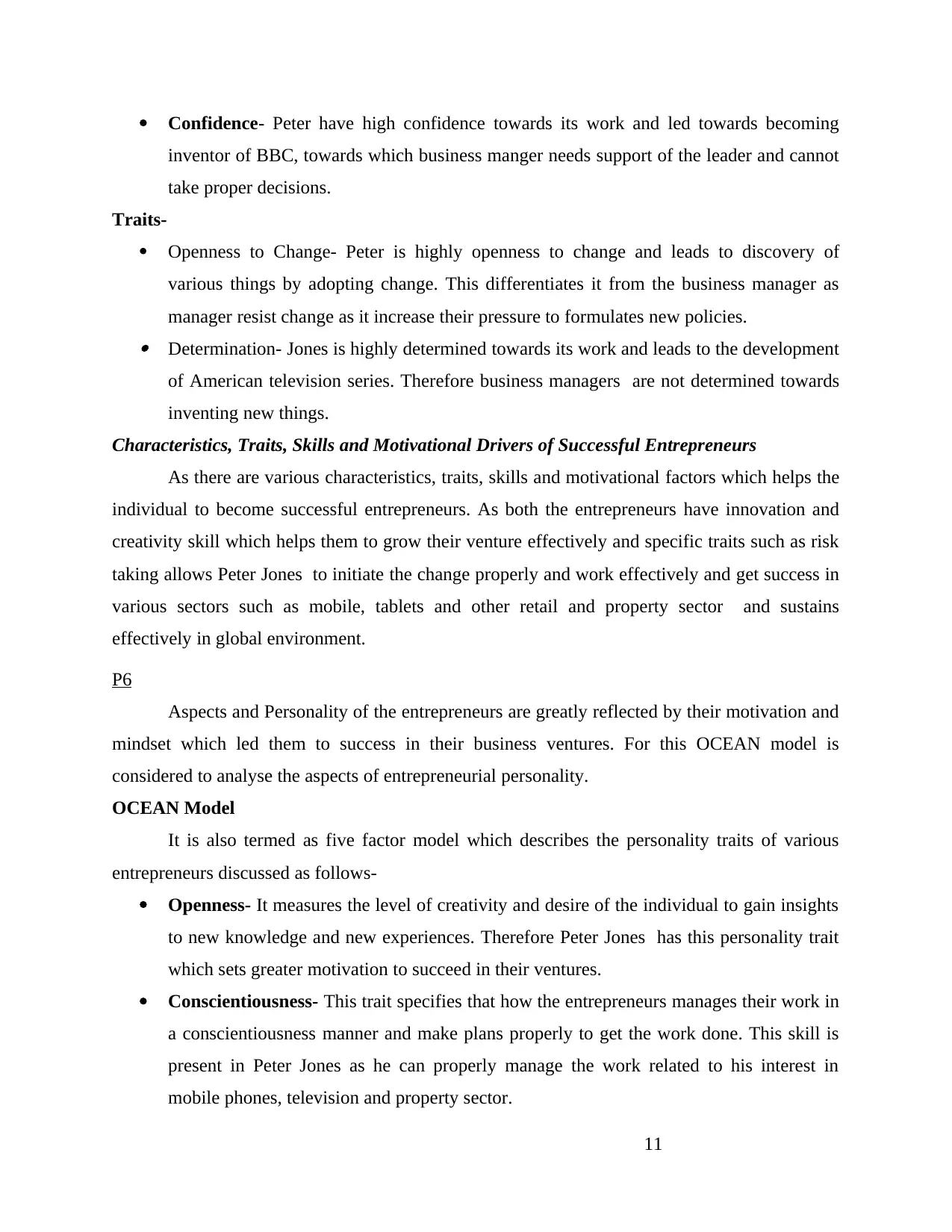
Confidence- Peter have high confidence towards its work and led towards becoming
inventor of BBC, towards which business manger needs support of the leader and cannot
take proper decisions.
Traits-
Openness to Change- Peter is highly openness to change and leads to discovery of
various things by adopting change. This differentiates it from the business manager as
manager resist change as it increase their pressure to formulates new policies. Determination- Jones is highly determined towards its work and leads to the development
of American television series. Therefore business managers are not determined towards
inventing new things.
Characteristics, Traits, Skills and Motivational Drivers of Successful Entrepreneurs
As there are various characteristics, traits, skills and motivational factors which helps the
individual to become successful entrepreneurs. As both the entrepreneurs have innovation and
creativity skill which helps them to grow their venture effectively and specific traits such as risk
taking allows Peter Jones to initiate the change properly and work effectively and get success in
various sectors such as mobile, tablets and other retail and property sector and sustains
effectively in global environment.
P6
Aspects and Personality of the entrepreneurs are greatly reflected by their motivation and
mindset which led them to success in their business ventures. For this OCEAN model is
considered to analyse the aspects of entrepreneurial personality.
OCEAN Model
It is also termed as five factor model which describes the personality traits of various
entrepreneurs discussed as follows-
Openness- It measures the level of creativity and desire of the individual to gain insights
to new knowledge and new experiences. Therefore Peter Jones has this personality trait
which sets greater motivation to succeed in their ventures.
Conscientiousness- This trait specifies that how the entrepreneurs manages their work in
a conscientiousness manner and make plans properly to get the work done. This skill is
present in Peter Jones as he can properly manage the work related to his interest in
mobile phones, television and property sector.
11
inventor of BBC, towards which business manger needs support of the leader and cannot
take proper decisions.
Traits-
Openness to Change- Peter is highly openness to change and leads to discovery of
various things by adopting change. This differentiates it from the business manager as
manager resist change as it increase their pressure to formulates new policies. Determination- Jones is highly determined towards its work and leads to the development
of American television series. Therefore business managers are not determined towards
inventing new things.
Characteristics, Traits, Skills and Motivational Drivers of Successful Entrepreneurs
As there are various characteristics, traits, skills and motivational factors which helps the
individual to become successful entrepreneurs. As both the entrepreneurs have innovation and
creativity skill which helps them to grow their venture effectively and specific traits such as risk
taking allows Peter Jones to initiate the change properly and work effectively and get success in
various sectors such as mobile, tablets and other retail and property sector and sustains
effectively in global environment.
P6
Aspects and Personality of the entrepreneurs are greatly reflected by their motivation and
mindset which led them to success in their business ventures. For this OCEAN model is
considered to analyse the aspects of entrepreneurial personality.
OCEAN Model
It is also termed as five factor model which describes the personality traits of various
entrepreneurs discussed as follows-
Openness- It measures the level of creativity and desire of the individual to gain insights
to new knowledge and new experiences. Therefore Peter Jones has this personality trait
which sets greater motivation to succeed in their ventures.
Conscientiousness- This trait specifies that how the entrepreneurs manages their work in
a conscientiousness manner and make plans properly to get the work done. This skill is
present in Peter Jones as he can properly manage the work related to his interest in
mobile phones, television and property sector.
11
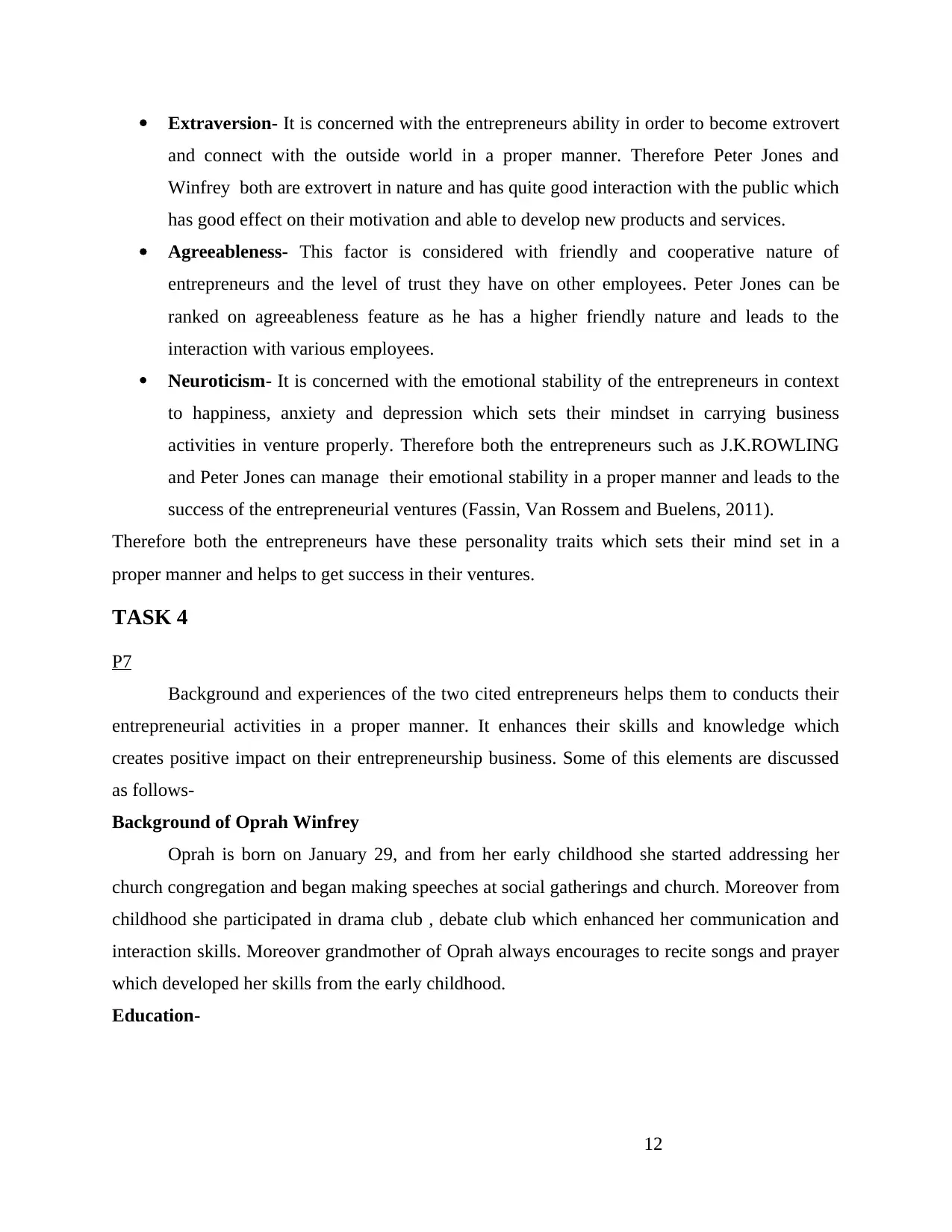
Extraversion- It is concerned with the entrepreneurs ability in order to become extrovert
and connect with the outside world in a proper manner. Therefore Peter Jones and
Winfrey both are extrovert in nature and has quite good interaction with the public which
has good effect on their motivation and able to develop new products and services.
Agreeableness- This factor is considered with friendly and cooperative nature of
entrepreneurs and the level of trust they have on other employees. Peter Jones can be
ranked on agreeableness feature as he has a higher friendly nature and leads to the
interaction with various employees.
Neuroticism- It is concerned with the emotional stability of the entrepreneurs in context
to happiness, anxiety and depression which sets their mindset in carrying business
activities in venture properly. Therefore both the entrepreneurs such as J.K.ROWLING
and Peter Jones can manage their emotional stability in a proper manner and leads to the
success of the entrepreneurial ventures (Fassin, Van Rossem and Buelens, 2011).
Therefore both the entrepreneurs have these personality traits which sets their mind set in a
proper manner and helps to get success in their ventures.
TASK 4
P7
Background and experiences of the two cited entrepreneurs helps them to conducts their
entrepreneurial activities in a proper manner. It enhances their skills and knowledge which
creates positive impact on their entrepreneurship business. Some of this elements are discussed
as follows-
Background of Oprah Winfrey
Oprah is born on January 29, and from her early childhood she started addressing her
church congregation and began making speeches at social gatherings and church. Moreover from
childhood she participated in drama club , debate club which enhanced her communication and
interaction skills. Moreover grandmother of Oprah always encourages to recite songs and prayer
which developed her skills from the early childhood.
Education-
12
and connect with the outside world in a proper manner. Therefore Peter Jones and
Winfrey both are extrovert in nature and has quite good interaction with the public which
has good effect on their motivation and able to develop new products and services.
Agreeableness- This factor is considered with friendly and cooperative nature of
entrepreneurs and the level of trust they have on other employees. Peter Jones can be
ranked on agreeableness feature as he has a higher friendly nature and leads to the
interaction with various employees.
Neuroticism- It is concerned with the emotional stability of the entrepreneurs in context
to happiness, anxiety and depression which sets their mindset in carrying business
activities in venture properly. Therefore both the entrepreneurs such as J.K.ROWLING
and Peter Jones can manage their emotional stability in a proper manner and leads to the
success of the entrepreneurial ventures (Fassin, Van Rossem and Buelens, 2011).
Therefore both the entrepreneurs have these personality traits which sets their mind set in a
proper manner and helps to get success in their ventures.
TASK 4
P7
Background and experiences of the two cited entrepreneurs helps them to conducts their
entrepreneurial activities in a proper manner. It enhances their skills and knowledge which
creates positive impact on their entrepreneurship business. Some of this elements are discussed
as follows-
Background of Oprah Winfrey
Oprah is born on January 29, and from her early childhood she started addressing her
church congregation and began making speeches at social gatherings and church. Moreover from
childhood she participated in drama club , debate club which enhanced her communication and
interaction skills. Moreover grandmother of Oprah always encourages to recite songs and prayer
which developed her skills from the early childhood.
Education-
12
⊘ This is a preview!⊘
Do you want full access?
Subscribe today to unlock all pages.

Trusted by 1+ million students worldwide
1 out of 15
Related Documents
Your All-in-One AI-Powered Toolkit for Academic Success.
+13062052269
info@desklib.com
Available 24*7 on WhatsApp / Email
![[object Object]](/_next/static/media/star-bottom.7253800d.svg)
Unlock your academic potential
Copyright © 2020–2026 A2Z Services. All Rights Reserved. Developed and managed by ZUCOL.



![Entrepreneurship and Small Business Impact Report - [University Name]](/_next/image/?url=https%3A%2F%2Fdesklib.com%2Fmedia%2Fimages%2Fwj%2Fd1f42599211847658d3fd556aa563fa5.jpg&w=256&q=75)

